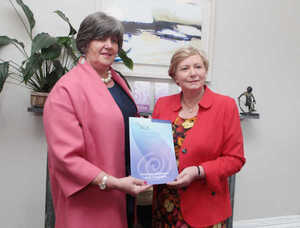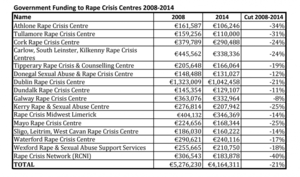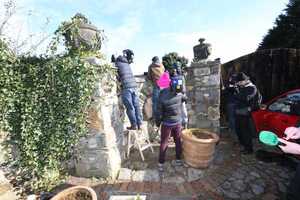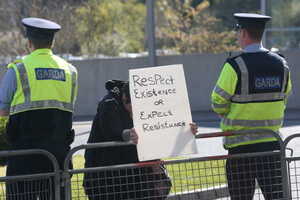Ellen O’Malley Dunlop, of the Dublin Rape Crisis Centre and and Justice minister Frances Fitzgerald; and Dr Julien Mercille
Rape Crisis centres across the country suffered funding cuts worth just over a €1million between 2008 and 2014.
But why the silence?
Dr Julien Mercille writes:
This post presents systematic data on funding cuts to all Rape Crisis Centres in the country since 2008, during the austerity programmes.
I obtained the data [see below] over several months by contacting every centre in the country and Government offices (HSE and Tusla). As I understand it, I’m the only person who has this national data. Even the Rape Crisis Centres themselves don’t seem to have anything beyond their individual budget.
This doesn’t indicate that I’m a good researcher, it indicates that nobody seems to care. I’m still surprised that this basic data on cutbacks wasn’t readily available until I asked for it.
This summer, I wrote a piece in the Irish Times based on the data, but I didn’t receive any request from media outlets, journalists or politicians to get the full set of numbers to take it further (actually, one radio station in Dundalk asked me to go on their show but they quickly cancelled the request and I never heard back).
In Ireland, 87% of victims of rape or sexual violence are women or girls, and conversely, 98% of perpetrators of all incidents are men.
The centres provide important services. About 2,500 people take up counseling annually.
The effects are undoubtedly positive. For example, among many testimonies from victims, one said: “This support group helped me realise that I was not alone and I was able to open up without fear or retribution. It will have an everlasting positive effect on me to carry in the future”.
But cutbacks have worsened the situation. One centre’s manager stated that the Government “has cut front-line services so much that it’s become impossible to operate” adequately.
Crucial work has been downgraded or eliminated, such as prevention and education programmes with young people in schools about the notion of consent in sexual matters.
Outreach work has been curtailed. Rural areas have been especially affected because such reductions in service provision often mean longer travel time to reach services, with the result that many victims are simply no longer able to avail of the counseling they need. This applies, for example, to Mayo, Enda Kenny’s constituency.
So what does the data (above) tell us? The chart outlines the cuts between 2008 and 2014 to every Rape Crisis Centre in the country, plus to the Rape Crisis Network (their umbrella organisation, whose funding has now been abolished completely).
It can be seen that overall cuts of 21% have been inflicted on the Centres. The cuts are uneven and vary from -8% in Galway to -34% in Athlone.
The overall reductions amount to a little more than €1 million, a number so small when compared to the general Government budget that no one would have noticed if it had not been axed.
It is estimated that funding should be at least €20 million, or five times current levels, in order to provide adequate services. This golden plan would still be insignificant in size compared to the State’s overall budget.
There is another important, and sensitive, aspect to all this. A few centres seem to have opted to lobby the Government and cosy up to it to obtain more funding for themselves, rather than form a common front with the other centres against the cuts.
These dynamics have been confirmed to me in discussions with Rape Crisis Centres managers and workers.
For example, the Dublin Rape Crisis Centre, headed by Ellen O’Malley-Dunlop, seems to have taken the Government side.
When I first wrote about cuts to the centres a few months ago, Ms O’Malley-Dunlop immediately called me. In a rather agitated tone, she told me that I should not write articles denouncing cuts.
She even described the Government as relatively generous because it had announced that no further cuts would be applied for 2015.
I was puzzled. How could the Government be described in such positive terms after presiding over funding cuts larger than 20%?
I asked her to explain to me her position, since I thought that exposing the cuts in the media was a good way to push back against these cuts. She said she couldn’t explain, that I wouldn’t understand, etc.
We thus have a surreal situation where some centres are against criticism of cuts to services for victims of rape.
In any case, the full systematic data is now public. Hopefully, this time, someone, somewhere, will do something about it.
Julien Mercille is a lecturer at UCD. His book Deepening Neoliberalism, Austerity, and Crisis: Europe’s Treasure Ireland is out. Twitter: @JulienMercille
(Leah Farrell/Rollingnews.ie)









We have a right wing government in power and a supportive media, INM, RTE, Today FM all march to the beat of the Fine Gael drum.
At this stage LAbour are merely spectators.
That’s charitable.
Labour are far, far more than spectators
Right-wing? Hah hah, hee hee *wipes eyes*
Can Julien provide evidence to support his statement that” funding should be at least €20 million, or five times current levels, in order to provide adequate services”?
With regard to the statement “As I understand it, I’m the only person who has this national data. “, surely the financials disclose the amounts received from government ? A quick comparison with prior years should indicate the cuts that were made.
The suggestion that some bodies are cosying up to the government , whilst others refuse to work together is rather unhelpful. Where is the evidence?
A weak piece and a very weak and pathetic attack on Ms. O’Malley-Dunlop.
Yeah sure it’s only rape like. Maybe someone could privatise the service.
Only the blueshirts and labour could make money out of rape. It’ll be sold to redacted, I heard he’s broke.
That would be Sinn Fein, Dav. Like Mercille, you should get your facts right .
“A weak piece and a very weak and pathetic attack on Ms. O’Malley-Dunlop.”
???
” I asked her to explain to me her position, since I thought that exposing the cuts in the media was a good way to push back against these cuts. She said she couldn’t explain, that I wouldn’t understand, etc.
We thus have a surreal situation where some centres are against criticism of cuts to services for victims of rape.”
How are his statements an attack on anyone….?
Either, somehow he is mistaken or this is a question that should be answered for the benefit of the public good. It’ll be another disgraceful situation to deal with if there is no evidence to prove these statements wrong.
More importantly, what if the answers unearth another skeleton from the closet of this backwards-thinking dysfunctional state?
:-J
While cuts are made to services that make a country civilised – NAMA (tax payer) is subsidising rapacious property speculators to the tune of millions in the process of selling portfolios at a suspiciously low discounts, also subsidising to the tune of millions many of the very profitable international firms who are here because we are ‘english speaking and remarkably good looking’ – Ireland is a Corporatocracy, those in power will retire from politics and will be sitting on boards of the very firms they were supposed to be regulating, as you sit in a hospital hallway, or worse, a city centre doorway.
oh can’t you run outside and play or something?
I’m not allowed, breaktime isn’t until 11.30
Hah! Well played.
Kolmo is right, which is why you responded with a personal attack.
That’s the right wing way, attack the man not the message
And yet you refer to Irish political parties as making ‘money out of rape’. Physician, heal thyself?
The Irish Political establishment does not deserve the same respect as should be afforded to your fellow citizens. It is worthy only of our contempt and the same should be shown on the sycophants that serve it.
I am confused about Dr Mercille’s articles. Are they opinion pieces or investigative articles? Very little that is published here would stand up to the evidentiary rigour required of either academia or journalism. His academic qualifications do not make him an authority on the variety of social/economic/political issues he covers. While I appreciate the need to questions those in power and elevate discourse, all his articles seem to do is highlight his inexperience and lack of knowledge in many areas, including this one. Perhaps the article should not have been published just yet and more time taken to thoroughly investigate? I would suggest starting with the fact that the group with the largest funding cut is RCNI who do not directly provide services and do not have a mandate from all RCCs. It’s pretty lazy to print supposition and attempt to tarnish a woman who has been a credible leader in the field of sexual violence service provision and research for several decades.
The articles make people on here mad, that’s seems to be enough.
” I asked her to explain to me her position, since I thought that exposing the cuts in the media was a good way to push back against these cuts. She said she couldn’t explain, that I wouldn’t understand, etc.
We thus have a surreal situation where some centres are against criticism of cuts to services for victims of rape.”
If a reasonably articulate animal form the Zoo wrote this and it proves to be true then the question is worth an answer.
If you leave it to the flag-waving (pseudo)intellectuals then we’re all fu*.*ed…
Learn how to play the ball and not the messenger.
:-J
And if we leave social /political/economic commentary to the zoo animals , then we will just end up bleating “Four legs good, two legs baaaaad” :-J
Joe,
In relation to your mixed metaphor regarding the ball and the messenger, I think in this case it is fair comment to question both, particularly so when the article is a hybrid opinion/investigative piece. Considering the source of information is fundamental to its interpretation. I’m fully behind having the debate about funding charitable organisations and i would advocate for greater transparency along with Dr. Mercille. I was merely suggesting that this ‘messenger’ up his game.
I also would draw attention to the inference that Dr Mercille seems to draw from the “tone ” used by Ellen O’Malley-Dunlop . The description used by Mercille of her tone smacks of subjectivity and is clearly at odds with what is supposed to qualify as “investigative” journalism. Dare I suggest that if Ms had been a Mr., then Mercille would not have bothered with such an irrelevant and trite detail.
+1 D’arcy.
Expect @Labour’s new Seanad hopeful Mairia Cahill can take the funding of the RCC up personally with Joan Burton. Not.
Putative Senator Cahill knows whereof she speaks.
I’m sure Mairia Cahill will get onto this as soon as she’s a senator.
But, but … RECOVERY!